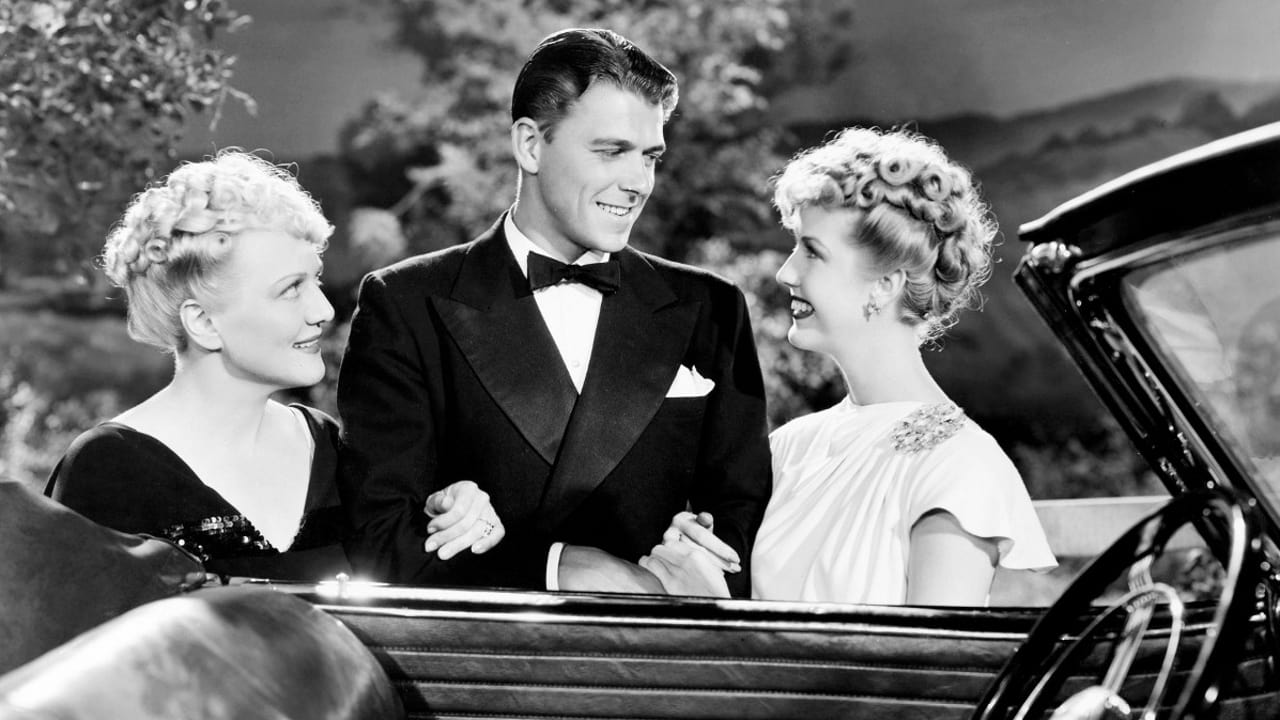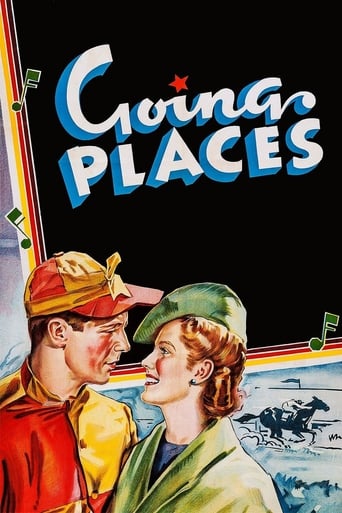

Stylish but barely mediocre overall
... View MoreGreat movie! If you want to be entertained and have a few good laughs, see this movie. The music is also very good,
... View MoreI think this is a new genre that they're all sort of working their way through it and haven't got all the kinks worked out yet but it's a genre that works for me.
... View MoreClose shines in drama with strong language, adult themes.
... View MoreAll the pieces are there - great cast, good story. Dick Powell, Allen Jenkins, Ron Reagan, and the amazing Louis Armstrong. Too many musical numbers, maybe ? and that bit where they prance Alan Jenkins around the apartment while they sing "Oh what a horse was Charlie" .... that must have been someone's favorite bit. They should have given more screen time to Cora and Colonel Withering. They don't show this one very often on Turner Classics... either it's not up to snuff, or maybe it's a rights issue. Very similar plot to the Marx Brothers' "Day at the Races", which came out the year before. Dick Powell pretends to be famed sportsman Peter Randall, which backfires later in the film. The horse at the center of all the excitement will only go when he hears L. Armstrong belt out the "Jeepers Creepers", which incidentally was the song from Warren & Mercer nominated for an Oscar, the film's only nomination. Directed by Ray Enright, who had started with Mack Sennett, served in WW I, then returned to the industry to work at Warner Brothers.
... View MoreSporting goods salesman uses the alias of a lauded horse-jockey from Australia to infiltrate Georgian high society to help promote his employer...how soon do you think it will be before he's on a racehorse himself? Semi-musical farce with romantic interludes also features Louis Armstrong performing the Oscar-nominated "Jeepers Creepers" to an unbroken horse who appreciates good jazz. Some amusing complications in an otherwise overly-familiar script adapted from the play "The Hottentot" by Victor Mapes and William Collier--it took even more writers to come up with the screenplay! In the lead, Dick Powell has such an easy, unassuming nature, one tends to give the film greater compliments than it really deserves. Harry Warren and Johnny Mercer wrote the songs, all novelty numbers. ** from ****
... View MoreThis is a very forgettable though enjoyable little film that has a lot going for it as well as a lot to hate. It's a very mixed bag, that's for sure! First, what to like. Dick Powell plays a nice likable guy (as usual) and there is some decent comedy in the film. It's the sort of nice time-passer they made so well during the era--a mindless but fun little bit of escapism. Plus, you do get to see a very early performance by Ronald Reagan as well as Louis Armstrong. Of the two, Armstrong definitely comes off best, as his singing is great and you are left wondering why he didn't make more films during the 1930s. Reagan is there mostly as window dressing and has little to do. He's not bad, but also not particularly noticeable.Now for the bad. If you are looking for a film to show your politically correct friends or to show to a local chapter of the NAACP, keep looking! Most of the Black people in the film are the typical stereotypical happy singing idiots that Hollywood loved during the 30s and 40s. It's sad to see Louis Armstrong, for instance, forced to play such a demeaning part--he was better than this. Also, the plot itself was majorly lame--really, really lame! Many films back then loved the idea of an animal or athlete responding magically to music. Most often it's a particular tune that makes the animal/athlete respond. In this case, the horse 'Jeepers Peepers' responds when he hears the song named for him. In the case of the Three Stooges, it was 'Pop Goes the Weasel' that made Curly box like a madman. There are countless other examples, but regardless this is a terribly contrived and stupid story element. Finally, although it's not as big a concern, it was awfully dumb to have Dick Powell playing an Aussie--especially since he sounded less Australian than Louis Armstrong or the horse!! Still, despite these many bad parts of the film, there are many genuinely good moments and you can't help but like Powell--no matter how contrived it all is.
... View MoreGOING PLACES (Warner Brothers, 1938), directed by Ray Enright, capitalizes on the then current trend of horse racing stories, the most famous of the time being MGM's A DAY AT THE RACES and SARATOGA (both 1937), and 20th Century-Fox's KENTUCKY (1938), among others. The writers of GOING PLACES bring a more modern approach to an oft-filmed story based on the William Collier play, "The Hottentot," previously lensed as a silent in 1923, an early talkie in 1929, and again as POLO JOE (1936) with Joe E. Brown. Starring Dick Powell in his third of four comedies with occasional songs produced during the 1938-39 period, this ranks the best and funniest of the four in many ways. First it presents Powell as likable leading man, as he had been for quite some time, and secondly, unlike his earlier effort in THE COWBOY FROM BROOKLYN (1938), Powell shows his fine flare for comedy. As with COWBOY FROM BROOKLYN, his character is also afraid of horses, but in GOING PLACES, it doesn't come out as silly and/ or forced. GOING PLACES is given fine support from Anita Louise, a very attractive blonde co-star, along with some fine character actors, Allen Jenkins and Harold Huber, and especially Walter Catlett, whose presence and comedic timing in confusion is most welcome here.As for the story, Powell plays Peter Mason, a sporting goods salesman at Detridge & Frome, with Franklin Dexter (Catlett) as his fellow assistant. Because Peter feels that not being able to sell their sporting goods is hurting business, he goes to Walter Frome (Robert Warwick), president of the company about this situation, and it is suggested that the store should advertise in order to improve sales and send someone to the Maryland steeple chase to demonstrate the horse riding outfits. Unable to get Peter Randall, the best gentleman rider in the world now vacationing in Australia, to do the demonstrating (and since the company has the rights to his name in advertising), it is suggested that Peter stand in and pose as Randall, with Dexter acting as his valet. Peter and Dexter then drive over to Maryland with a stock of sporting goods as an advertising stunt. Arriving at the hotel there, Peter makes the acquaintance a couple of Peter Randall fans, Cora Withering (Minna Gombell), and her beautiful niece, Ellen Parker (Anita Louise), who both know of the famous Peter Randall, but don't know of his physical appearance. Because of this pretense, Peter finds himself talked into riding Ellen's horse, Jeepers Creepers, in an upcoming race, causing Peter, who is terribly afraid of horses, to get the creepers. Along the way, Peter and Dexter encounter of race track gamblers down on their luck, Maxie (Harold Huber) and Droopy (Allen Jenkins), who insist that Peter ride in the race so they can collect on the winnings.Featured in the supporting cast are: Ronald Reagan as Jack Withering; Larry Williams as Frank Kendall; Thurston Hall as Colonel Harvey Withering; Joyce Compton as Jean; Eddie Anderson as George; Louie Armstrong as Gabriel; and Maxine Sullivan as a maid and specialty singer.With the music and lyrics by Harry Warren and Johnny Mercer, the songs are as follows: "Jeepers Creepers" (sung by Louis Armstrong); "Say It With a Kiss" (very briefly sung by Dick Powell on the piano/ possibly a deleted song or number); "Oh, What a Horse Was Charley" (sung by Dick Powell, Walter Catlett, Allen Jenkins and Harold Huber); and "Mutiny in the Nursery" (sung by Louie Armstrong, Dick Powell, Anita Louise, Maxine Sullivan and others). Of the four tunes, only "Jeepers Creepers" remains the most memorable, being honored for an Academy Award as Best Song for 1939, losing to "Over the Rainbow" from THE WIZARD OF OZ (MGM). The "Oh, What a Horse Was Charley" segment is quite amusing, in which Powell tries to prove to Jenkins and Huber that he is only a composer, not the famous horse rider. In order to convince them, Powell, along with Catlett, make up the words to his new composition, ending with all four men participating in the song with their own "made up" lyrics, ending with Huber and Jenkins playing horsey and galloping out of the hotel room. "Mutiny in the Nursery" is a catchy but not-to-memorable jive number featuring nursery rhymes, including "Little Bo-Peep" to the lyrics.In spite of some of its shortcomings, GOING PLACES is highlighted with several funny sequences, including two segments where Powell rides Jeepers Creepers, first accidentally landing on the horse's back by falling from the top of the barn, going about the country road minus a saddle, giving the people the impression of what a great rider he is while all along he is quite fearful and wants to get off. The climatic race is equally funny when Powell, Jockey # 13, rides Jeepers Creepers only to have the horse run off the track and around town, rushing through the back yards of residences and laundry lines, followed by the overly familiar routine where the horse runs through the ditch, causing the ditch-diggers to flop out one by one. With the help of the bugle playing Louie Armstrong and his musician friends, orchestrating to the tune "Jeepers Creepers," does the wild horse tame itself and return to the track where it belongs. Many of the comic gags presented here are standard and typical for the likes of such comedians as the Marx Brothers (A DAY AT THE RACES, 1937) or Abbott and Costello (IT AIN'T HAY, 1943), but in watching Powell doing the same makes GOING PLACES, which can be seen on cable television's Turner Classic Movies, both interesting viewing at 84 minutes, as well as a real curio. (***)
... View More